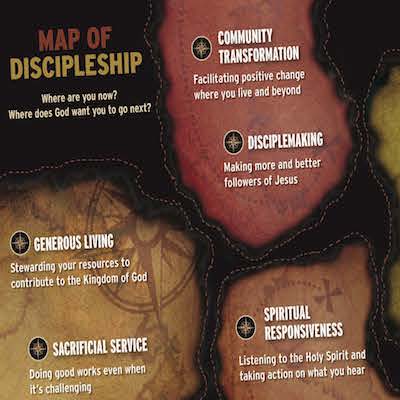Description
Guide for Discipling contains 40 lessons covering the 8 dimensions of discipleship
Purchasing this downloadable version gives you license to print copies for use in your personal discipling relationships.
If you are interested in purchasing individual guides, links are provided in the descriptions below.
Love God. Love People. Make Disciples.
A disciple of Jesus is a reflection of God in the world. As Jesus discipled people, he expected that their discipleship would touch all aspects of their life, relationships, and even society as a whole.
Experiencing God: Intentionally and consistently engaging with God in such a way that you open yourself to a deeper understanding of him and deeper relationship with him.
Spiritual Responsiveness: Actively listening to the Holy Spirit and taking action according to what you are hearing.
Sacrificial Service: Doing good works even when it’s costly, inconvenient or challenging.
Generous Living: Faithfully stewarding what God has given you so you can contribute toward the advancement of the Kingdom.
Disciplemaking: Living in obedience to the great commission given by Jesus, which entails making more and better followers of Christ.
Personal Transformation: Changing your attitudes and behaviors in positive ways as a result of your relationship with God and others.
Authentic Relationships: Engaging with other people in ways that reflect the heart of God toward them.
Community Transformation: Personal involvement with others to facilitate positive change where you live and beyond
The eight topics just described flow from our previous book, The Discipleship Difference: Making disciples while growing as disciples. The book lays out our full philosophy of making disciples. This set of 8 discipleship guides then is essentially an expansion of chapter two, where we discuss the qualities of a disciple. What is a disciple? How would you know if you saw one? What behaviors would he or she exhibit? You can then use these guides to grow in holistic discipleship.
The Guides for Discipling are organized according to the tree diagram above. Experiencing God, at the root of the tree, focuses on the way we interact and dialogue with God, the way we become increasingly aware of his presence, and how we continue to form a more personal relationship with him. This root is necessary for all of the other areas, as they flow out of our experience of God.
Spiritual Responsiveness then builds on those roots as we seek to listen to God and respond to the voice of his Spirit in obedience. From there, the branches can be worked through in any order, according to what you are hearing from God.
The end result will be transformation– not of ourselves only– but of others and the whole of the community around us.





Reviews
There are no reviews yet.